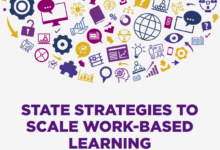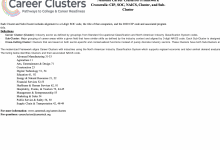In addition to enabling learners to gain work experience while in high school, work-based learning helps students hone the academic, technical and employability skills needed to succeed in postsecondary and the workplace. This resource highlights what work-based learning is and gives recommendations on how to support high-quality work-based learning programs. Here are five recommendations:
- Provide tax or other financial incentives for employers who engage with schools and offer work-based learning opportunities to students.
- Reduce legal barriers to student participation by establishing clear policies for appropriate student liability insurance coverage.
- Define success metrics for work-based learning and regularly collect and report on them.
- Recognize work-based learning metrics in graduation requirements, accountability measures and school fiscal incentive models.
- Prioritize funding, support and resources for historically underserved students and communities.






